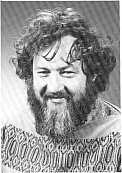TOM RAINEY
 I was born in 1936 of poor, but proud Southern parents.
I was born in 1936 of poor, but proud Southern parents.
The outstanding memory in my mind of World War II was that Daddy
was away
and that I couldn't have those great steel soldiers that didn't melt
in water like the
paper mache ones (The war effort, you know!)
After a mediocre high school career (35th out
of a class of 85), I got drunk and
joined the Navy. Five years of defending the American way of life was
enough for me.
With a wife and two children in tow, I enrolled in the University of
Florida. In 1962,
three years later, I graduated and began the long climb for my educational
union card-
the Ph.D. in Russian History!
My memories of graduate school
are all negative. Vicious competition with my peers
for a handful of graduate stipends, stuffy professors trying to make
me speak and write Harvard
english, the amassing information to teach history "without apologies"
-these are things that stand
out as I think about those years of my life. I have no friends
from graduate school. In the good
old American way, I copped the coveted goodies by wiping out
the tracks of my fellow graduate students.
My first teaching job was
at the University of Arkansas. The president, who made $3,000 less
a year than the football coach, greeted the new faculty with these words:
"We want to have a school that our football team can be proud of" .
We were then informed that football boys were exempt from the usual
grading system. A year later I fled after a church-state dispute
with a dean who was also the baseball coach and a free-will baptist preacher
on the side. And besides, I was being called to the "Princeton of
the South" -Duke University.
My education -or re-education
-began at Duke, and from a most unexpected source. Certainly it did
not come from my colleagues, who proved for the most to be petty, pedantic,
boring, and little concerned with the social problems
that are tearing this country apart. It came from the students
and a handful of faculty that joined them to try and solve some of these
problems, at least as they applied to Duke. Bang! Martin Luther King
was assassinated. Two thousand Duke students and 9 faculty members, including
myself, staged a mass, non-violent demonstration which demanded a most
revolutionary change at Duke -a union for the non-academic employees.
We lost. My contract was not renewed. I departed
for the other side of the cotton curtain. This time for the University
of Buffalo, which had proudly declared itself the "Berkeley of the East".
More student strikes, more real education, more disappointing and disallusioning
experiences with my colleagues- that was U.B. for me.
Where has all this left me?
I am now more fully convinced that the university must concern itself with
the social problems that beset us. The university is not neutral.
It is not a haven from the outside world, as much as many of us would
like it to be. With this concern in mind, I wish to exchange
ideas with students who are interested in the following general fields
of study: Contemporary American social problems; The Native
American; Wealth and power in America; Balkan History and Literature;
Russian and East European history and Literature. Actually, ignorance
has never driven me from a conversation. I'll talk to anybody about anything,
almost any time.
«»
 I was born in 1936 of poor, but proud Southern parents.
I was born in 1936 of poor, but proud Southern parents.